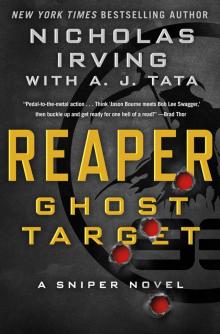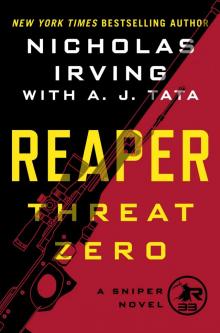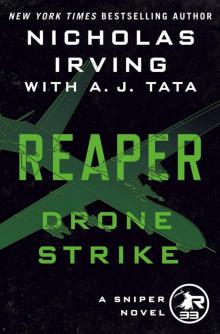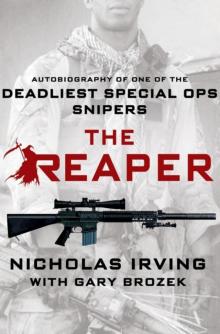- Home
- Nicholas Irving
Ghost Target Page 8
Ghost Target Read online
Page 8
“Then sit back down and be a man, Ranger Child. If you’ve done nothing wrong, then there’s nothing to be afraid of. After all, you’re an airborne Ranger in the U.S. Army. You going to let a shiny-headed dude in a suit get you all flustered?” Murdoch asked, smiling. He winked at Bronson. “Now turn around and sit your ass back down and answer the man’s questions. Or you can answer mine in my office later … which you may still have to do.”
Child spun around in a professional about-face movement and sat down, this time with an erect back and palms downward on each thigh.
“Sir, I was on leave for the past week. Home in Florence, South Carolina. My ma can account for my whereabouts,” Child said.
“Thank you, Sergeant. Now about your weapon.”
“Got the receipt in my room, sir. Turned it in to the armorer in Afghanistan.”
Bronson looked at Command Sergeant Major Murdoch.
“I can help there. I vaguely remember that. Something about a firing-pin issue. Got him an M24 as a replacement, then we needed someone on the Barrett. Ranger Child is a big guy and can haul that hunk of metal around better than most.”
“Can we talk to the armorer?” Bronson asked. All the while, it felt like a hollow lead, but still, he needed to check it out. He wanted to press the button on his phone to check the time—he didn’t wear a watch unless he was on a dinner date—and felt that he was losing momentum. The other sniper team using an SR-25 might bear more fruit. Missing soldier and missing weapon. Was that too much of a coincidence? Nonetheless, he pursued Child’s angle.
“He’s rotated out, but we can check to see if he filed a disposition form to destroy or sell the weapon,” the sergeant major said.
“If the weapon was sold,” Bronson replied, looking over his shoulder at White for reassurance, “there would be an ATF form on that, right?”
“That’s right, Special Agent. ATF form thirty-three ten,” White said, leaning forward, referring to the Bureau of Alcohol, Tobacco, Firearms, and Explosives nomenclature for a weapons-disposition document.
“Well, that’s a paper trail we need to check,” Bronson said. He looked at Child. “You’ve been very helpful. Thank you. We will give your mother a call, just FYI.”
“Be nice to her. She don’t feel well most the time,” Child said.
“You’re dismissed,” Bronson said, standing. To the sergeant major, he said, “Can I have a private audience with you in your office?”
“Roger that.”
“There was one thing,” Child said as he stood.
Bronson was already on to the next item, but glanced at Child and twirled his hand in a motion that said, “Go ahead, already.”
“I was on the SAR team security. I did some crater analysis back when I was in Iraq,” Child said, as if that war was of a different era. “No way those mortars came from Sangin. The spall was toward the enemy, not away from them.”
“That’s good to know, Sergeant. Thank you,” Bronson said. Turning to the sergeant major, he said, “Ready?”
Child departed with a quick about-face. Bronson waved his staff off and followed the large man into an office filled with headshots of fresh-faced rangers wearing tan and sometimes black berets.
“All my KIA,” Murdoch said when he caught him looking at the pictures on the far wall. “Reminds me that my job is never done. Now how can I help?”
The two men sat at opposite ends of the same sofa, which was situated below the rows of pictures, as if the spirits of the warriors were watching them. Bronson figured that was probably part of the sergeant major’s purpose. Youthful eyes keeping him honest. Keeping his nose to the grindstone. Making him never forget.
“What do you know about your missing Ranger and Ranger Harwood?”
“Lots. Harwood is like a son to me. He was a foster child, came to the army because he had nowhere else to go. I have spies in basic training that tip me off to the hard chargers. Harwood was a hard charger from day one. Had something to prove to everyone. We get a lot of kids like that, but Harwood was a cut above. More physically fit and more deadly with a rifle. Ranger material right away. I recruited him into the unit and put him in Third Battalion here in Fort Benning so I could keep an eye on him. I stay in the barracks and so did he, of course. While the others were playing Xbox, I was helping Harwood with his shooting and other skills, especially mixed martial arts.”
“What happened to him? And to Samuelson?”
“Well, I know Samuelson, of course, but not as well as I know Harwood. Sammie was new and Harwood had just lost his spotter. He was on a roll. The men were calling him the Reaper. I let it stick, because I think Harwood kind of liked the nickname. And let’s face it. You get a nickname, that usually means you’re accepted. The guys without nicknames are usually the ones who never fully integrate. I was worried about Harwood at first, but then he started performing like a machine, killing every bad guy. That rifling check you’re asking about? We’d pulled some bullets out of some dead Taliban in the surrounding areas after we had to conduct a damned investigation because someone said we had killed a civilian. Well, turns out we didn’t, but still, we had all these dead Taliban commanders and Harwood knows they’re his kills. A Ranger doesn’t ask for much, but he will want credit for how much safety and security he has provided his teammates and, by extension, our country. So Harwood was concerned when a special forces A-team claimed credit for those kills. Of course, they did so only after the investigation cleared us of killing a civilian. The armorer that rotated out was the guy who took the lead and some of the casings in to your guy.”
Bronson soaked in the information, processed it.
“Sounds like we might be looking for Harwood’s rifle. Any of those rounds come from Child’s SR-25?”
The Sergeant Major paused then nodded.
“Maybe. I approved their little clandestine mission to take the bullets over to your guys. May seem petty or stupid, but when you’re holed up in Kandahar and you’re out there getting your ass shot off every day, a little bit of feedback and affirmation that you’re making a difference goes a long way.”
“Doesn’t seem petty or stupid. We were glad to do it.” Bronson processed the irony that his current mission had come full circle from that day in Afghanistan.
“So I guess you want to know about Harwood?”
“Well, him and Samuelson.”
“The search-and-rescue team found an SR, which we assumed to be Harwood’s. It was pretty banged up. At the time, we were more concerned about finding Samuelson. The SR got shipped back to the states with Harwood and the rest of his gear. Just how we do it. Ranger and his equipment. Now, you’re going to ask me where that rifle is, and I checked when I heard about all of this. It’s not in the arms room, and the armorer has no record of it.”
“Just a second, sergeant major. The SR-25 you recoverd. We don’t know whose it was or where it is?”
Murdoch paused and nodded. “That’s right. We’ve essentially got two missing weapons. Samuelson carried as SR, also. This was a screwup by the armorer. He should have logged in the serial number and so forth. Instead, it was bedlam. The SAR team came under some fire as they were doing the aerial medevac of Harwood. I was waiting for them at the hospital in Kandahar. But it was just Vick. He’s lucky to be alive. We got Harwood back, the docs stabilized him for a few hours in Kandahar, and then we put him and all his equipment on the C-17 to Germany. Then we sent raids all over Helmand Province, that’s southern Afghanistan, looking for Samuelson. That’s his picture over there on the wall.”
Bronson thought about the missing weapon and drew the conclusion that Harwood was a solid candidate for the shooter. He looked at the photograph of the young man. High and tight haircut. Tan beret. Fresh face. Not on the dead wall. Somewhere else. Like purgatory. Where was he? Captive? Dead and blended with the earth in Afghanistan? Alive and roaming around? Shooting generals?
“Did either Harwood or Samuelson have authority issues?”
�
�None whatsoever. Harwood respected authority. Wanted it. Needed it. Samuelson was your average Ranger, which is better than ninety-nine percent of humanity, mind you.”
“So we don’t know where Samuelson is, but we do know about Harwood, right?”
“Yes. I got him a job training snipers for JSOC and other units. Don’t know exactly where he is right now since he’s freelancing it as a temporary duty soldier on loan from Walter Reed, where he is presently assigned. We try to integrate soldiers back into the force gradually until they’re ready for combat again. Harwood has been working out like a fiend. Need to get him back on the range though. He’s a sniper. The Reaper. That’s what he knows.”
“Can you find him for me? Just so I can talk to him?” Bronson asked. He softened his voice, as if he were sympathetic to the sergeant major’s connection with Harwood. Murdoch’s face twitched just a bit, a microexpression. Bronson understood, given Murdoch’s and Harwood’s close relationship. The man would want to be as protective as possible with his protégé.
“Sure. Might take me a few phone calls.”
“Any chance he’s in Savannah?”
“Where that retired general just got his head blown off? Heard about that. Our First Battalion of Rangers is down that way, so it’s possible.”
“Thank you, Sergeant Major. I’ll take my team into our Suburban and we’ll huddle and compare notes, knock out some emails, and when you’ve got a bead on Harwood, can you just send a runner out to let us know.”
Murdoch nodded. “Roger that.”
Bronson shook Murdoch’s giant catcher’s mitt of a hand and departed the sergeant major’s office, collected his team, and piled into the Suburban under the watchful eyes of dozens of tan beret–wearing Rangers collecting around the headquarters wondering what was happening. Night had fallen and streetlights dotted the road. Spotlights lit up the fence behind the headquarters to keep intruders at bay. They were in the heart of the most elite unit in the military. The place thrummed with professionalism and no-nonsense commitment to duty. Rangers moved smartly about the area, carrying weapons, issuing orders, and preparing for the next day.
Ten minutes later, Murdoch walked up to the SUV. Bronson powered down his shaded window.
“Harwood checked into the Hunter Army Airfield enlisted quarters a few hours ago. Then he went for a run, according to the clerk.” After a pause, the sergeant major looked away and then back at Bronson. “But he’s not your guy. I guarantee you that.”
Bronson nodded. “Thank you, Sergeant Major.”
“And remember. You mess with him, you mess with me. Not a threat. If he’s done no wrong and you put the squeeze on him for no good reason, expect some blowback. That’s how I roll. Up-front and direct.”
“Someone might say that you are threatening a federal agent, Sergeant Major. I thought we were getting along just fine?” Bronson said.
“You didn’t listen to me very well. I’m obligated to give you the truth and every bit of information I have. That’s the code we live by. Help allies, help law enforcement, help the good guys. You turn out to be a bad guy? You’re toast. Trust me on that.”
Bronson nodded, somewhat impressed with Murdoch’s spine. Most leaders should have been this passionate about their charges.
“I understand,” Bronson said.
“For your sake, I pray that you do.”
Bronson buzzed the window up as the driver pulled away slowly. He turned to Faye Wilde and said, “Call the pilots and tell them to file a flight plan for Hunter Army Airfield immediately.”
CHAPTER 9
Harwood normally slept soundly, but awoke to Jackie’s movement. She slipped out of bed, sheets ruffling and some body part banging into the lamp in the unfamiliar hotel room. He watched through one sleepy eye as she packed her bags, flipped on the bathroom light, and dressed in the pale glow by the hotel room door.
She came back to the nightstand, spotted what she was looking for, and reached out for a rubberized flotation device. It had a small chain through it with a few keys, some large and some small. As she shined her iPhone light on the nightstand he saw the words “Ten Meter Lady”—her nickname with the Olympic team—printed on the rubber key chain. Beneath that were the words “River City Marina” in small, italicized print.
“What’s going on?” Harwood asked.
“Got a text,” she said. “I need to get to an event in Atlanta that I totally spaced on.”
“Atlanta? It’s…” He checked the hotel clock. “It’s after midnight. Can’t you just go in the morning?”
“It’s an early appearance. A signing, I think,” she said.
“You think? You don’t even know what it is and you’re bugging out like this?”
“Vick, I love you. I’m with you as much as I possibly can be, but I’ve been so focused on you, us,” she said, waving her hand between them, “I’ve got a calendar glitch. It’s no biggie. I’ll catch up with you in Seattle in a few days. You were supposed to teach one class here and then head out, right? We’ll catch up when you hit Second Ranger Battalion.”
He leaned up, flicked on the light. Something wasn’t right. He had spent enough time with Jackie by now that he knew her voice tones. Her speech carried an unfamiliar octave, an inflection of nervousness.
“What’s wrong?” he asked. He stood and walked over to her. She was standing in the rectangle of light cast from the bathroom. She was dressed in denim jeans, a dark gray T-shirt, running shoes, and a black windbreaker that had the five-ring Olympic logo and the letters “USA” embroidered on the left breast.
She stepped toward him and placed her hands on his shoulders, looked up at him with her wide blue eyes, and said, “Nothing, Vick. Nothing other than me freaking out over my schedule and not fulfilling my obligations. You’ve become my world and I still have obligations, you know?”
Harwood brushed some hair away from her forehead and kissed her first there and then on the lips.
“I understand. Let me help you with your stuff.”
“No, really. I’m feeling guilty enough as it is by waking you up. You should leave soon, too, but I’ve got this,” she said. Jackie lifted her rucksack, slung it over her shoulder, tugged on the four-wheel roller suitcase, kissed him again, and then walked out of the room. “I left you a few more bottles of your new favorite sports drink,” she said over her shoulder. Jackie winked and smiled.
She stood in front of the elevator door, tapping her thumb on the opposite wrist, her impatience cue. She had somewhere to be. Driving to Atlanta from Savannah at one in the morning was not wise, but if she had a commitment, who was he to stop her? And she was right. She had been there for him the past three months. Not every day, but most days. Completely smitten with her, Harwood had begun to envision a lifelong future with the Olympic sharpshooter. Their children would be expert marksmen.
The elevator doors opened with a chime. Jackie looked over her shoulder, blew him a kiss, and stepped into the car. The doors snapped shut and she was gone.
Harwood shut the door, flicked off the bathroom light, and lay back in bed, trying to sleep with his head propped against the fluffy pillows. Restless, he grabbed the remote and turned on the television. The news channels were all running with the story of two generals killed in twenty-four hours. One at Fort Bragg and one in Savannah. He paused on one channel with a reporter standing outside of Fort Benning’s main gate.
Interested, he turned up the volume and absently pulled apart the plastic wrap sealing a six-pack of Jackie’s sports drinks. He lifted the octagonal plastic bottle and raised it to his mouth.
Then stopped.
Removing his eyes from the television, he rolled off the bed, walked across the room, knelt, and pawed through his rucksack. He retrieved a round bottle with a similar label of Jackie smiling and holding her Olympic gold medal. Walking into the bathroom, he studied the two bottles. The name of a major soda manufacturer was stamped on the base of the octagonal bottle. The round bottle had tiny chara
cters from Arabic or a Middle Eastern language in the exact same spot. The bottles had identical labels. He looked in the mirror and said, “What the hell?”
Is someone spiking my drinks?
He turned his head when he heard a reporter on the television.
“An inside source tells us that the FBI is already here at Fort Benning, Georgia, interviewing Army Rangers and not only that, Dave, but Army Ranger snipers. We saw a government plane land at Fort Benning’s Lawson Army Airfield, so there is evidence that the FBI is here. Also, my sources tell me that there has been a match between the ammunition that killed the two generals and a sniper rifle used in Afghanistan. They’re looking for an SR-25 sniper rifle.”
Harwood walked slowly from the bathroom and stood in front of the television. The image showed a man holding a microphone standing in front of the military police checkpoint at the main gate of Fort Benning. His mind spun. He placed the two sports drinks on the bureau. He stared at them as if he were looking at fraternal twins, one evil, the other not. The television kept crawling with the news and the leads. Images flashed in his mind. At Fort Bragg, sucking down a sports drink from a round bottle. General Sampson arriving in his driveway. Him passing out in the workout pit. The police sirens afterward. Running. Then at Hunter Army Airfield sucking down another drink from a round bottle, the run, General Dillman on the porch. Him fainting. And now here he was in Jackie’s room. She had mysteriously left at 1 A.M.
Was it all too good to be true? Was someone trying to say that he shot the generals?
As if to add accent to his last thought, blue lights flashed against the window of Jackie’s eighth-floor hotel room.
The television reporter said, “And, Dave, I’ve just been told that the government airplane left here about an hour ago headed to Hunter Army Airfield in Savannah, a short forty-five-minute flight away. My source tells me that a main person of interest in this investigation is this man.”
The reporter was holding a copy of Rolling Stone magazine. Harwood stared out from the television, eyes dim, checked scarf around his neck, salt-stained uniform clinging to his muscular frame, Lindsay cradled in his arms. The average viewer would think he was a menacing figure.

 Ghost Target
Ghost Target Threat Zero
Threat Zero Reaper: Drone Strike: A Sniper Novel
Reaper: Drone Strike: A Sniper Novel The Reaper: Autobiography of One of the Deadliest Special Ops Snipers
The Reaper: Autobiography of One of the Deadliest Special Ops Snipers